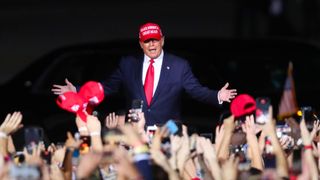Truth has been under assault in the United States for longer than Donald Trump has been the in the Oval Office. However, this election campaign has quickened the rate of truth decay to the point that the outcome of the election has already been undermined.
In addition to consistently claiming the election will be "rigged" and rife with "fraud", the Trump campaign has already released ads celebrating his re-election. A video posted to Facebook features a cartoon image of a sun with Donald Trump's face rising over rolling green hills to the words "It's morning in America. Donald J. Trump is STILL the president of the United States". Flowers sporting crying faces sprout from the ground and release a chorus of "nooo!" while a hummingbird fashioned as Trump buzzes around the screen laughing at them.
In addition to consistently claiming the election will be "rigged" and rife with "fraud", the Trump campaign has already released ads celebrating his re-election.
It's a bizarre and juvenile spin on Ronald Reagan's immensely successful "Prouder, Stronger, Better" campaign in 1984 which famously opened with the words "It's morning again in America" before listing ways in which Americans were better off than they had been four years earlier. The difference in tone between the two ads is almost laughable. Reagan touted more jobs, more marriages and higher home ownership. The US of 2020 is gripped by a pandemic it has handled far worse than most of the world, it's suffering an economic recession and a public reckoning over race relations at a scale larger than the civil rights movement.
The ad was placed eight days before the election to flout Facebook's one week ban on "new" political advertising. Facebook won't block the ad because it's technically true: Trump will be the president the day after the election. Even if he loses it, he will be the president until January 20, 2021. This is emblematic of the grey chasm between truth and falsehood in American politics that Donald Trump has aggressively widened. The intent is to provoke opponents, and to imply that Trump has won the election, regardless the result and, indeed, at a time when it's likely to be unclear.
Trolling as politics
Quite simply, these 15 seconds of paid political advertising resemble a base philosophy of politics in the US concerned more with beating opponents - or claiming victory - than truth. Seven days before the election, the White House's science policy office ranked "ending the pandemic" as one of President Trump's major achievements. This was a day when more than 70,000 more Americans tested positive to the virus, and nearly 1000 Americans died from it.
It sounds chaotic, and it's meant to be. This is the trolling ethos that previously only defined pockets of the internet and not an entire political culture. It's often remarked that there's no keyboard for sarcasm online, but the trouble with distinguishing intent in the delivery of information has spilled into the mainstream of American politics. Trumpism, as it has come to be known, has degraded the weight with which a president's words are supposed to be heard.
President Trump was "joking" when he suggested people inject disinfectant to combat coronavirus, he was "optimistic" when, despite knowledge to the contrary, he promised the coronavirus would simply disappear and he "misspoke" when he told white supremacists and far-right street gangs to "stand back and stand by" when directly asked if he would condemn them.
Faced with such chaos, individuals will lean towards consuming and believing the content they agree with. By speaking to some of the darkest anxieties of white America, Donald Trump has energised a crucial constituency and entrenched America's fundamental differences.
The trolling "Morning in America" ad is just one small part of a loose strategy of "flooding the zone with s**t" attributed to President Trump's now indicted former campaign manager Steve Bannon: If there is too much information available, it becomes immensely difficult for anyone to sort truth from misinformation and disinformation; well-intended messages from those designed to do damage.
Faced with such chaos, individuals will lean towards consuming and believing the content they agree with. By speaking to some of the darkest anxieties of white America, Donald Trump has energised a crucial constituency and entrenched America's fundamental differences.
Social media algorithms have been designed to force-feed users with content that captivates them. This, in concert with already historic levels of partisanship in the US and cable news, paves the way for off-hand opinion, misinformation, and conspiracy theories to dominate media diets.
The description of content that spreads rapidly as "viral" is not accidental. Misinformation has tangible consequences. The World Health Organization, itself the subject of the President's ire, warns that the flood of misinformation circulating about COVID-19 can be as dangerous as the virus itself.
A recent report from Cornell's Department of Global Development suggests that President Trump is the world's leading source of COVID-19 misinformation. Indeed, throughout the course of his first term, President Trump has told more than 20,000 lies.
The party of Trump
Politicising fact has serious consequences. But its effectiveness has led to a situation where the party of Trump is unwilling to give any sense that it doesn't consent to his mistruths.
Time after time, Republican senators and those around the President claim they haven't heard his damaging and false statements or tweets. Time and time again they reject to even engage with subjects that they know the President doesn't like.
It is now accepted beyond doubt that Russia interfered in the 2016 presidential election. But after the impeachment saga and the President's complaints about a focus on "Russia, Russia, Russia," national security officials augmented the way they deliver concerning intelligence on Russia. This has consequences, as we found out when the US President denied ever seeing reports that Russia had facilitated bounties on American servicemen in Afghanistan. A revelation like this would traditionally be cataclysmic for a Republican president's standing within his own party.
Time after time, Republican senators and those around the President claim they haven't heard his damaging and false statements or tweets. Time and time again they reject to even engage with subjects that they know the President doesn't like.
In October, Republican members of the House Intelligence Committee declined to attend a hearing on misinformation and conspiracy theories.
Had they attended, they would have heard experts plead for more to be done to protect American democracy from the erosion of truth. Nina Jankowicz, a Disinformation Fellow at the Woodrow Wilson International Center for Scholars told the hearing that "Foreign adversaries no longer need creativity or brute force to be successful. They need only sit back and watch, regurgitating and amplifying what is already endemic to our society". The cost of entry and level of sophistication needed to influence American politics has never been lower, and this election is already its victim.
Truth and the result of the 2020 election
What happens in the aftermath of November 3 is innately tied to the value of truth in the US. Most recently and most frequently, the President has been spreading disinformation about the election and casting pre-emptive doubt on the result. The Facebook ad is only one example of this, but there is a darker sub-plot to the messaging about fraud and the election: What people choose to do about it.
In the first presidential debate, President Trump offered one course of action. He said, "I'm urging my supporters to go into the polls and watch very carefully because that's what has to happen. I am urging them to do it". These are not the hallmarks of a healthy democracy.
My esteemed colleague Bruce Wolpe told the National Press Club that the days surrounding this election will be the tensest in the US since 9/11. The reason for such tension is that passion about this election result has overridden apathy. Both candidates running for president have essentially promised that the US will fall apart if they are not elected.
A prolonged period where it's not clear who will be the President of the United States in 2021 will deal tremendous damage to the stock of democracy around the world, especially if victory is declared regardless.
In a country where individualism is not at a premium, social inequality is abundant and guns are ubiquitous, the risk for violent civil unrest is not a trivial one.
According to the Foundation for the Defense of Democracy's David Kilcullen, the US of 2020 meets many of the criteria for an "insipient insurgency". It's a term usually reserved for countries outside the world's top economies.
An election result with supposed existential stakes in these circumstances presents a dangerous flashpoint. This is heightened further considering campaign lawyers are already preparing for a protracted battle over the validity of any result.
A prolonged period where it's not clear who will be the President of the United States in 2021 will deal tremendous damage to the stock of democracy around the world, especially if victory is declared regardless.
After an accelerated four-year assault on truth itself, the stakes are set for a situation where if the eventual result of the election is unacceptable to a portion of Americans, they may well reject it outright and choose their own reality.
It's morning again in America; or is it?






